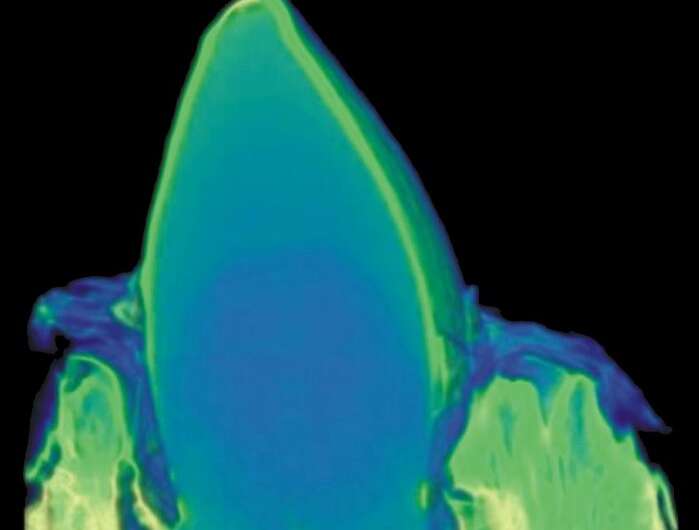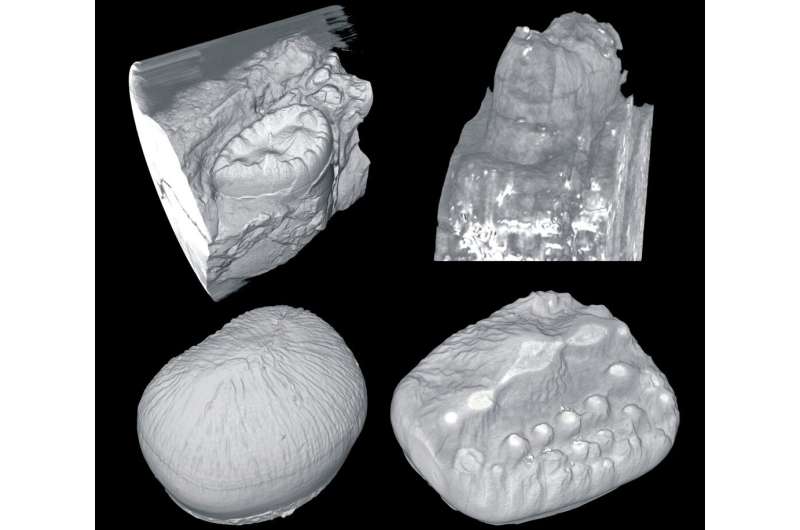No teeth cleaning needed: Crocodiles shed old teeth, grow new ones

Unlike people, crocodiles do not clean their teeth to slow down wear and tear. Instead, they get rid of them and replace them with new copies.
Having one of the most powerful bites in the animal kingdom, crocodiles must be able to bite hard to eat their food such as turtles, wildebeest and other large prey. Now, researchers at the University of Missouri have found that crocodiles—and even their plant-eating ancestors—had thin tooth enamel, a trait that is in stark contrast to humans and other hard-biting species. These findings could suggest new approaches for dealing with people's teeth.
"Once we unlock genetically how crocodiles and other non-mammals do this, maybe new teeth can be bioengineered for people," said Brianne Schmiegelow, a former undergraduate student at MU and current dental student at University of Missouri-Kansas City. "Instead of using fillers such as crowns, people could instead 'grow' new teeth when they need to replace their worn out chompers."
The team used a three-dimensional X-ray scanner to measure the thickness of tooth enamel in crocodiles. They found regardless of tooth position—incisor, canine, molar—age or diet, crocodiles do not have thick tooth enamel. With this new information, the team also studied published data on dinosaur teeth and found that the data nearly matched what they were seeing in crocodiles. For instance, a Tyrannosaurus rex has the same enamel thickness as a crocodile and can also bite extremely hard.

"Crocodiles bite really hard, so we were curious if they have teeth that correspondingly withstand those forces—tough teeth to match a tough bite," said Kaleb Sellers, a postdoctoral fellow in the School of Medicine at the University of Missouri and lead researcher on the study. "We found that they don't have tough teeth, and we think it's because they replace their teeth like most other non-mammal animals. That made us wonder if other animals—even prehistoric—had similar issues."
Researchers said the next step is to study tooth replacement and the timing of teeth growth in crocodiles and other animals such as dinosaurs—even looking into the possibility of genetic causes.
"Enamel takes a long time to build, so it's not something animals will do 'off-the-cuff,' so to speak," said Casey Holliday, an associate professor of anatomy in the MU School of Medicine. "It presents us with an interesting puzzle. If ancient crocodiles were chewing plants, did their new teeth already have the correct architecture—dimples and facets—to allow for this chewing? The findings here have paved the way for exploring this mystery with future research."
The study, "The significance of enamel thickness in the teeth of Alligator mississippiensis and its diversity among crocodyliforms," was published in the Journal of Zoology.
More information: K. C. Sellers et al, The significance of enamel thickness in the teeth of Alligator mississippiensis and its diversity among crocodyliforms, Journal of Zoology (2019). DOI: 10.1111/jzo.12707
Journal information: Journal of Zoology
Provided by University of Missouri-Columbia




















